- Global Capability Center (GCC) in India is an offshore center fully owned by a multinational company to deliver business functions like IT, analytics, and operations using Indian talent.
- Setting up a GCC in India include defining goals, conducting feasibility studies, selecting a location, registering the entity, building infrastructure, hiring talent, and starting operations.
- Top GCC hubs in India include Bengaluru (IT capital, 880+ centers), Hyderabad (software development), Mumbai (financial services), Pune (manufacturing/engineering), Delhi NCR (e-commerce), and Chennai (engineering).
- Key Benefits include access to a skilled workforce, cost savings, strong digital infrastructure, and a supportive environment for innovation.
- Main challenges involve handling regulations, tough talent market, ensuring smooth global integration, and managing compliance costs.
Need help establishing your GCC in India? Contact our team today!
Discover how Wisemonk creates impactful and reliable content.
Curious about how to set up a Global Capability Center (GCC) in India for your global business? This guide is designed for leaders looking to solve talent challenges, boost cost efficiency, and master digital transformation with a GCC in India. Whether you’re planning to set up, scale, or optimize your captive center, we cover everything from city selection and setup process to key hubs, challenges, and actionable best practices, strategic decisions for your next Global Capability Center in India. Let’s get started and unlock real advantage for your business!
What is GCC in India?[toc=What is GCC in India]
A Global Capability Center (GCC), also known as a captive center or Global In-House Center (GIC), is a strategic offshore unit wholly owned and operated by a multinational corporation. Having guided the establishment of numerous GCCs, we can attest that these centers are designed to leverage global talent, advanced technology, and operational efficiencies to deliver critical capabilities and drive accelerated innovation for their parent organizations..
Key Features of GCCs in India:
- Deliver core functions like software development, data analytics, and process automation.
- Attract top talent and skilled professionals from India’s highly skilled workforce.
- Foster digital transformation and operational efficiency for global projects.
- Enable cost efficiency and substantial cost savings for parent companies.
- Operate within a mature GCC ecosystem supported by ongoing government and industry investment.
Why should you choose India for Global Capability Centers?[toc=Why Choose India]
Drawing from our direct experience helping global companies establish GCCs in India, we have seen the country become a preferred destination for Global Capability Centers due to several critical advantages:
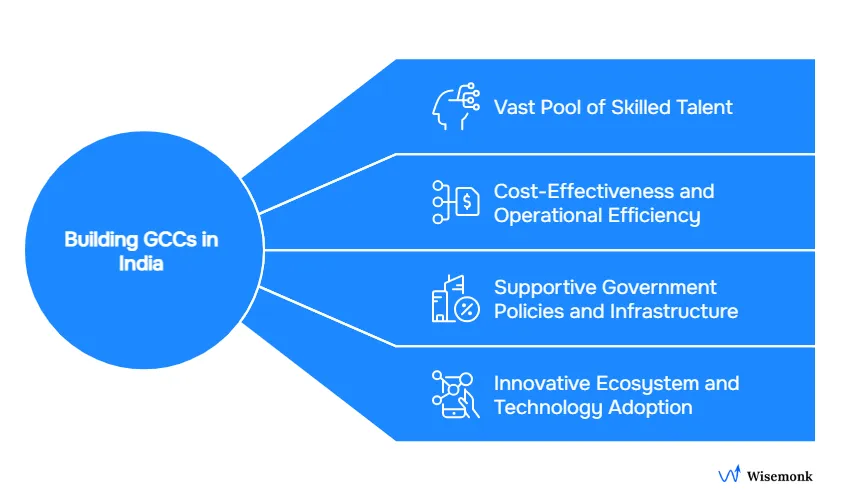
- Rich Talent Pool: India offers a vast and diverse talent pool of skilled professionals, especially in data science, software development, process automation, and emerging technologies. Access to global talent ensures innovation and operational efficiency for global projects.
- Cost Efficiency: Significant cost savings, combined with value creation, make India attractive for both new and established GCCs. Companies benefit from lower operational costs while investing more in digital transformation and core functions.
- Robust Infrastructure: With robust infrastructure, world-class IT parks, and a conducive environment supported by the Indian government, India enables smooth and scalable global operations.
- Innovation and Digital Transformation: India’s mature GCC ecosystem supports global innovation hubs, driving advancements in cutting-edge technologies, data analytics, and process automation for multinational corporations and parent companies.
- Business-Friendly Ecosystem: Business-friendly policies and support from the Indian government, along with the ability to scale quickly and operate 24/7, provide a competitive edge in the global business landscape.
How to set up a GCC in India?[toc=How to Set up GCC]
Establishing a Global Capability Center (GCC) in India is a strategic decision for organizations seeking to leverage cost efficiency, skilled talent, and robust infrastructure. In our experience, a structured approach is crucial for success. Here’s a clear step-by-step guide based on our hands-on work with GCC setups:
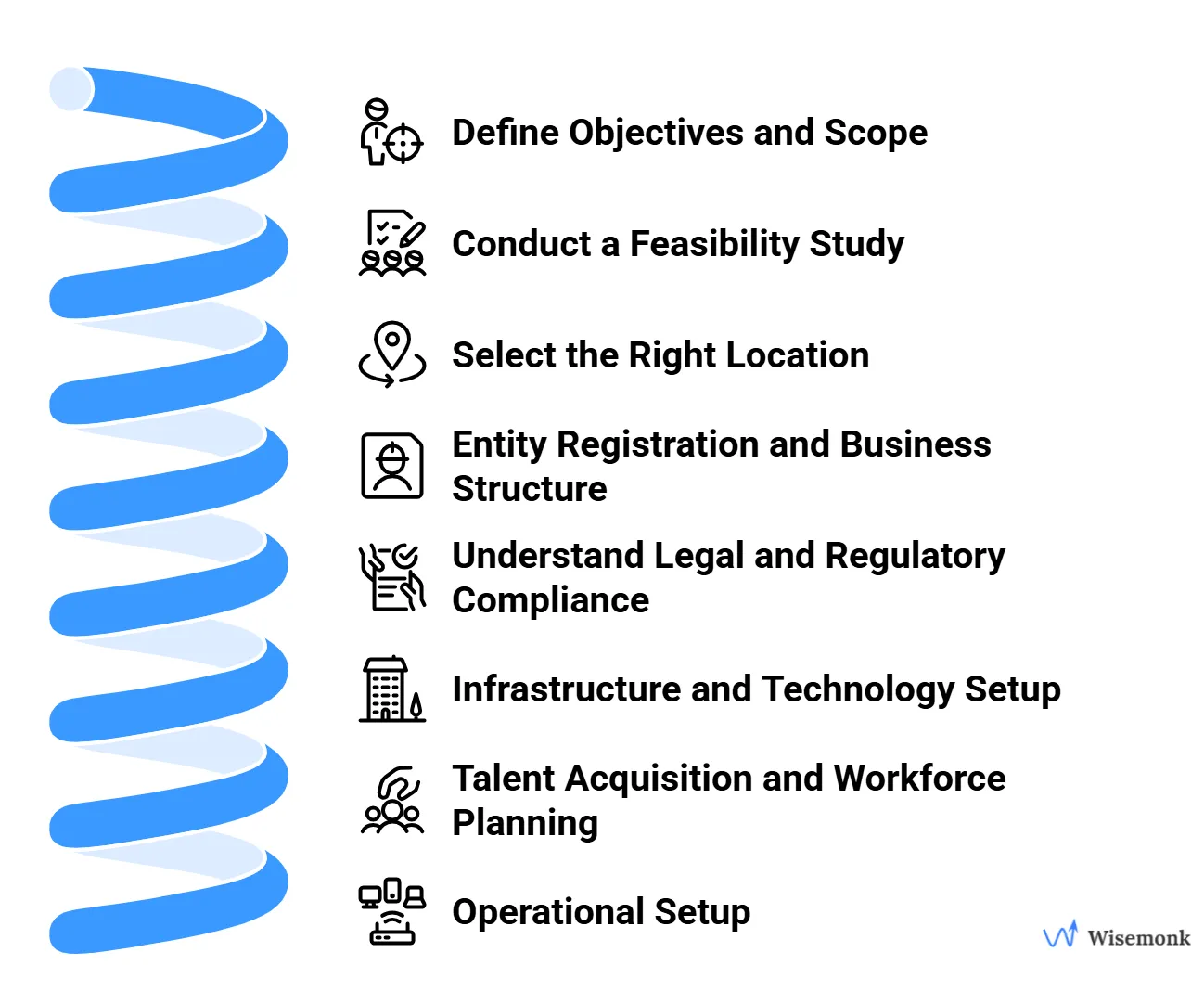
Step 1: Define Objectives and Scope
Before initiating the setup process, clearly define the objectives of the GCC. This includes identifying the specific functions the center will serve, such as IT services, customer support, research and development, or engineering. Align these objectives with the broader goals of the parent organization to ensure coherence in strategy.
Step 2: Conduct a Feasibility Study
A comprehensive feasibility study is essential to assess the viability of establishing a GCC in India. Based on our work with numerous clients, key components of this study should include:
- Market Analysis: Evaluate market conditions, competition, and demand for services.
- Talent Availability: Assess the local talent pool's skills and qualifications.
- Cost Analysis: Estimate operational costs, including salaries, infrastructure, and overheads.
- Risk Assessment: Identify potential risks and challenges associated with setting up operations in India.
Step 3: Select the Right Location
Selecting the right location for your GCC is a critical decision that can significantly impact its success. This step involves evaluating potential cities, considering factors like talent availability, infrastructure, and cost of living. Many companies focus on tech hubs like Bangalore or Hyderabad due to their established IT ecosystems. Then, choose an office space that meets current needs and allows for future expansion. Factors to consider include accessibility, nearby amenities, and the potential for creating an attractive work environment.
Step 4: Entity Registration and Business Structure
Once you have chosen a location, you must establish a legal entity in India. Common structures include:
- Private Limited Company (PLC): Offers limited liability protection and operational flexibility.
- Limited Liability Partnership (LLP): Suitable for smaller setups with less regulatory overhead.
- Branch Office or Subsidiary: Ideal for companies seeking direct ownership with minimal liability.
Ensure compliance with all legal requirements by registering your entity with relevant authorities.
If you need any help to register a company in India, check out our article "Register a Company in India: Everything You Need to Know", it walks you through the entire process and shows how we can help make it seamless from start to finish.
Step 5: Understand Legal and Regulatory Compliance
Navigating India's legal landscape is critical for establishing a GCC. Key compliance areas include:
- Taxation: Familiarize yourself with corporate tax rates and transfer pricing regulations to avoid disputes.
- Labor Laws: Adhere to employment contracts, provident fund contributions, gratuity policies, and other labor regulations.
- Data Privacy: Implement measures to protect sensitive data in compliance with Indian data protection laws.
Step 6: Infrastructure and Technology Setup
Investing in the right infrastructure is vital for operational efficiency. Design an efficient office layout that supports your operational needs and allows for growth. The layout should promote collaboration while also providing spaces for focused work. Setting up robust IT systems and networks that integrate smoothly with the parent company's global infrastructure to ensure smooth communication and data flow. Implementing security measures that include both physical security measures to protect the office space and cybersecurity protocols
Step 7: Talent Acquisition and Workforce Planning
Recruiting the right talent is crucial for the success of your GCC. Starts with developing a targeted recruitment strategy. This strategy should include effective employer branding to position your GCC as an attractive workplace. Building your core team involves recruiting skilled professionals who not only have the necessary technical skills but also align with your organizational culture. Ensure that salary packages are attractive to attract top talent while remaining cost-effective. Implement a thorough onboarding process to ensure new hires can quickly integrate and contribute to the GCC's objectives.
Step 8: Operational Setup
Establish clear operational processes for the effective functioning of a Global Capability Center (GCC). This involves defining workflows, responsibilities, and performance metrics that align with the GCC's objectives. By implementing key performance indicators (KPIs), organizations can measure success and ensure that operations are efficient and effective. Additionally, creating a governance structure helps maintain alignment with corporate goals and compliance with regulatory requirements.
What are the types of GCCs in India?[toc=Types of GCCs]
In our extensive experience guiding global companies through the Indian market, we’ve seen that Global Capability Centers (GCCs) in India play a diverse and strategic role by serving various business needs across industries.
Here are the main types of GCCs we've helped establish and manage in India:
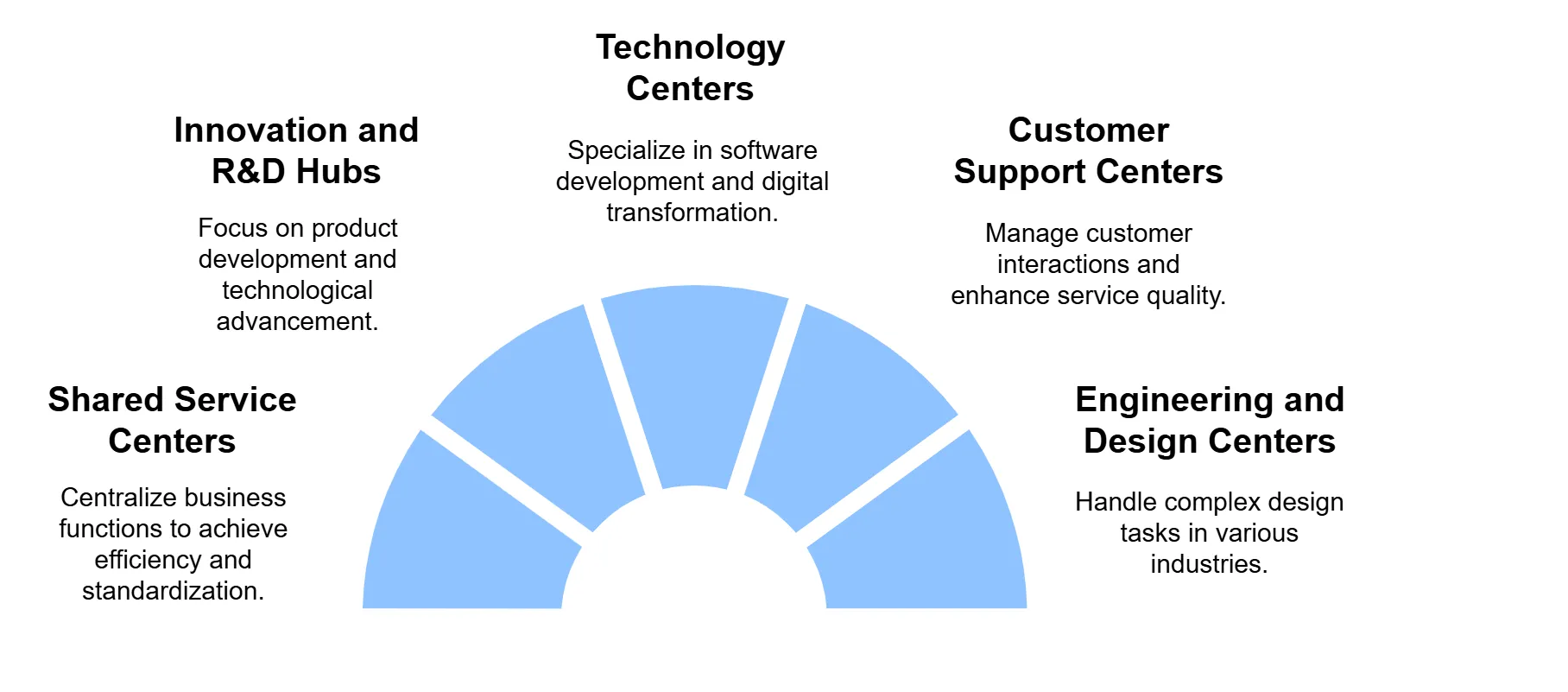
- Technology and Innovation Centers: Focus on software development, data analytics, digital transformation, and emerging technologies. These centers drive innovation and process automation, supporting the advancement of cutting-edge technologies and global projects.
- Shared Services Centers: Deliver core functions such as finance, HR, procurement, and risk management. Their operations are designed to enhance operational efficiency and cost savings by streamlining business processes for global companies.
- Global Operations Hubs: Manage a wide array of back-office operations, customer support, supply chain, and logistics services to enable seamless global business landscape integration.
- Research and Development (R&D) Centers: Concentrate on development, testing, and product design. These centers leverage India’s robust infrastructure and rich talent pool to drive innovation and maintain a competitive edge for multinational corporations and parent companies.
- Specialized Centers: Focus on niche areas like data science, data security, artificial intelligence, or industry-specific functions, leveraging local expertise and India’s diverse skill sets to deliver highly specialized capabilities to existing GCCs and new GCCs.
India’s GCC ecosystem remains dynamic and continues to evolve, accommodating the strategic importance and diverse requirements of global capability centers, established GCCs, and multinational corporations seeking growth, efficiency, and innovation.
What are the key GCC hubs in India?[toc=GCC Hubs]
India has established itself as a global leader in the Global Capability Center (GCC) landscape, with several cities emerging as prominent hubs for multinational businesses. Our experience has shown that each city offers unique advantages, catering to various sectors and business needs:
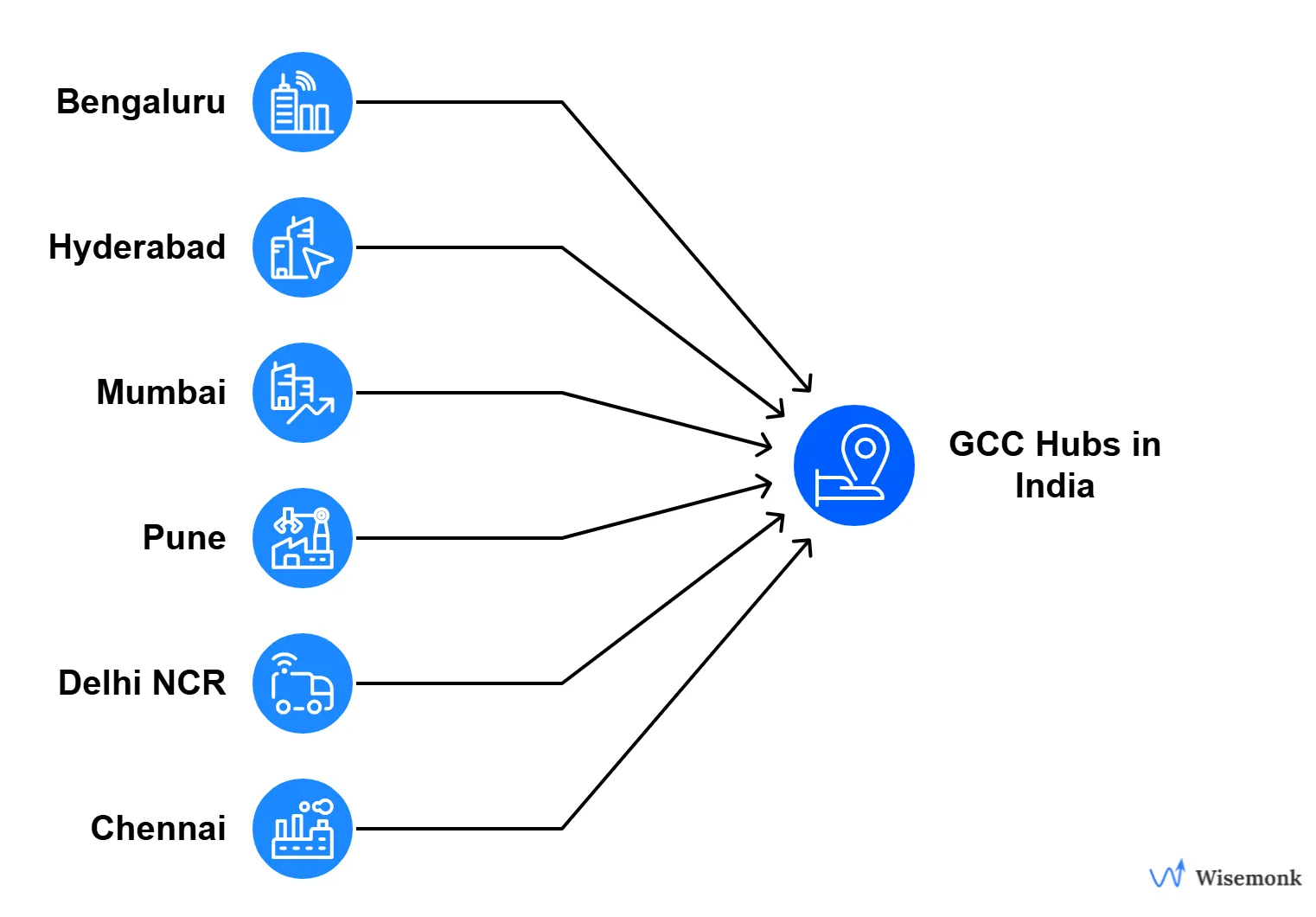
- Bengaluru: The top GCC destination, hosting over 880 global capability centres, especially in IT, software development, and innovation. Its vibrant startup ecosystem and skilled engineering workforce attract global companies and parent organizations.
- Hyderabad: Home to 355+ centers, Hyderabad excels in software development and digital transformation. A strong technology talent pool and government-backed innovation initiatives drive its rapid growth as a global operations hub.
- Mumbai: As India’s financial capital, Mumbai supports over 720 GCCs focused on banking, finance, and insurance. Its strategic location and deep talent pool make it ideal for financial services and global business operations.
- Pune: Known for manufacturing and engineering excellence, Pune’s GCCs work on high-value tasks for automotive and engineering firms. Its proximity to top educational institutions supports steady growth in skilled professionals.
- Delhi NCR: This region, including Gurugram and Noida, is a hotspot for e-commerce and retail. Companies benefit from its strong infrastructure, diverse talent pool, and access to a vast consumer market.
- Chennai: With over 305 centers, Chennai specializes in engineering services, automotive, and manufacturing-focused GCCs. A strong STEM graduate base and stable operations make it a hub for engineering innovation.
- Emerging Tier-2 Cities: Cities like Coimbatore, Ahmedabad, and Jaipur are gaining traction as cost-effective alternatives, supported by expanding infrastructure and growing talent pools.
India’s key GCC hubs, each with distinct advantages, enable global companies to leverage skilled professionals, robust infrastructure, and sector-specific expertise for operational efficiency and innovation across their global capability centers.
What are the best practices for setting up a GCC in India?[toc=Best Practices]
Based on our extensive experience assisting global companies and parent organizations with setting up GCCs in India, we’ve found that adhering to proven best practices ensures operational efficiency, risk management, and long-term success. Here are the most effective approaches:
- Strategic Location Selection: Choose GCC hubs with a rich talent pool and robust infrastructure, such as Bengaluru, Hyderabad, or Pune, to maximize access to skilled professionals and cost efficiency.
- Regulatory Compliance and Data Security: Ensure complete compliance with Indian legal and regulatory requirements, including labor, tax, and data security laws, by leveraging local expertise and established GCC ecosystem support.
- Talent Acquisition and Development: Invest in hiring and nurturing global talent with diverse skill sets relevant to core functions like software development, data analytics, digital transformation, and process automation.
- Robust Infrastructure and Technology: Set up world-class office spaces with cutting edge technologies and strong digital infrastructure to drive innovation and operational efficiency across global operations.
- Governance and Continuous Improvement: Establish transparent governance frameworks, strong risk management practices, and metrics to track operational performance, cost effectiveness, and impact on global capability. Foster an innovation-driven culture to maintain a competitive edge within the global business landscape.
Following these best practices, as seen across established GCCs and new GCCs in India, leads to sustainable growth, seamless global integration, and enhanced strategic importance within your organization.
What are the challenges faced in setting up a GCC in India?[toc=Challenges]
Setting up a Global Capability Center (GCC) in India presents several challenges that companies need to navigate carefully. Drawing from our experience guiding GCC setups, here’s an expert breakdown of the key challenges faced when establishing a GCC:
- Initial Setup Challenges: The initial phase of setting up a GCC is critical. Weak initial setup, including expecting the office manager or recruiting team to handle both operational and strategic tasks, can lead to a poor start.
- Regulatory Compliance: Companies often struggle with understanding and following the various laws and rules set by the Indian government. These include regulations on how to price services between the GCC and the parent company, special rules for operating in certain business zones, and strict labor laws. There are also new data protection laws and rules about handling foreign currency.
- Talent Acquisition and Retention: Finding and retaining skilled professionals is a significant challenge, especially in emerging markets. GCCs must compete with established IT and technology companies for talent, and high attrition rates can disrupt operations.
- Operational Model and Integration: Setting up an efficient operating model and ensuring tight integration with the parent company can be challenging. Without proper alignment, GCCs may struggle to deliver expected outcomes at scale, face cost overruns, and have difficulty aligning with organizational roadmaps.
Why Choose Wisemonk for Setting up GCC in India?[toc=How Wisemonk helps]
Wisemonk is a leading Employer of Record (EOR) in India, dedicated to helping global companies set up and manage Global Capability Centers (GCCs) with ease. Our comprehensive suite of services is designed to ensure a smooth transition and operational efficiency for your GCC, so you can focus on scaling your business.
Key Features of Wisemonk:

- Rapid 2–4 day onboarding and exit management for Indian hires.
- Tailored talent acquisition and recruitment strategies.
- Specialized compliance with Indian payroll and statutory benefits.
- End-to-end equipment procurement and management.
- Dedicated India-based HR (human resources) support and employee self-service portal.
Beyond EOR services, we offer comprehensive payroll processing, contractor management, company registration, background verification, work permit & visa assistance, and office setup support. By partnering with us, you gain a trusted local ally who simplifies every aspect of your GCC’s setup and ongoing operations in India, making your expansion seamless and fully compliant.
Let us help you unlock the full potential of your Global Capability Center (GCC) and drive innovation within your organization. Contact Wisemonk today!
FAQs
Which are GCC companies in India?
Major GCC companies include Google, Microsoft, Amazon, JPMorgan Chase, Goldman Sachs, SAP, HSBC, PepsiCo, Shell, and Bosch, all of which operate large centers across India.
What is the cost of GCC setup in India?
Setting up a GCC in India typically costs between ₹5 crore to over ₹100 crore, depending on location, scale, and infrastructure, with operational costs about 30-40% lower than other global locations.
For more details, explore our article on: "What is the average cost of setting up and running a GCC in India compared to other countries?"
Which cities are GCC in India?
Top GCC hubs in India include Bengaluru, Hyderabad, Mumbai, Pune, Chennai, and Delhi NCR, with emerging growth in cities like Ahmedabad, Kochi, and Jaipur.
How many GCCs are there in India?
As of mid-2025, India hosts around 1,700–1,900 GCCs, and this number is expected to exceed 2,400 by 2030.
Is India in the GCC countries?
No, India is not a member of the Gulf Cooperation Council (GCC); it is a location for Global Capability Centers, a different context entirely.
What is India's GCC?
India’s GCCs are offshore centers set up by global companies to leverage local talent for core business operations, innovation, and technology-driven solutions.
What is the GCC center in India?
A GCC (Global Capability Center) in India is an offshore unit set up by a global company to centralize business functions such as IT, R&D, finance, and customer support. These centers leverage India’s skilled workforce and advanced infrastructure to support global operations efficiently.
Why is GCC coming to India?
GCCs are coming to India due to the country’s large rich talent pool, cost-effectiveness, robust digital infrastructure, and supportive government policies, making it an ideal location for innovation and global business operations.
Why are GCCs important?
GCCs drive strategic innovation, implement digital transformation strategies, and act as technology hubs for multinational corporations (MNCs), enabling cost-efficient scaling and global competitiveness.
What is the future outlook for GCCs in India?
India’s GCC market is projected to reach $110 billion by 2030, with 2,400–2,550 centers employing 4.5M professionals. Tier-II cities like Coimbatore and Visakhapatnam will drive continued growth, while GCCs transition into global innovation hubs for AI, metaverse, and advanced analytics.






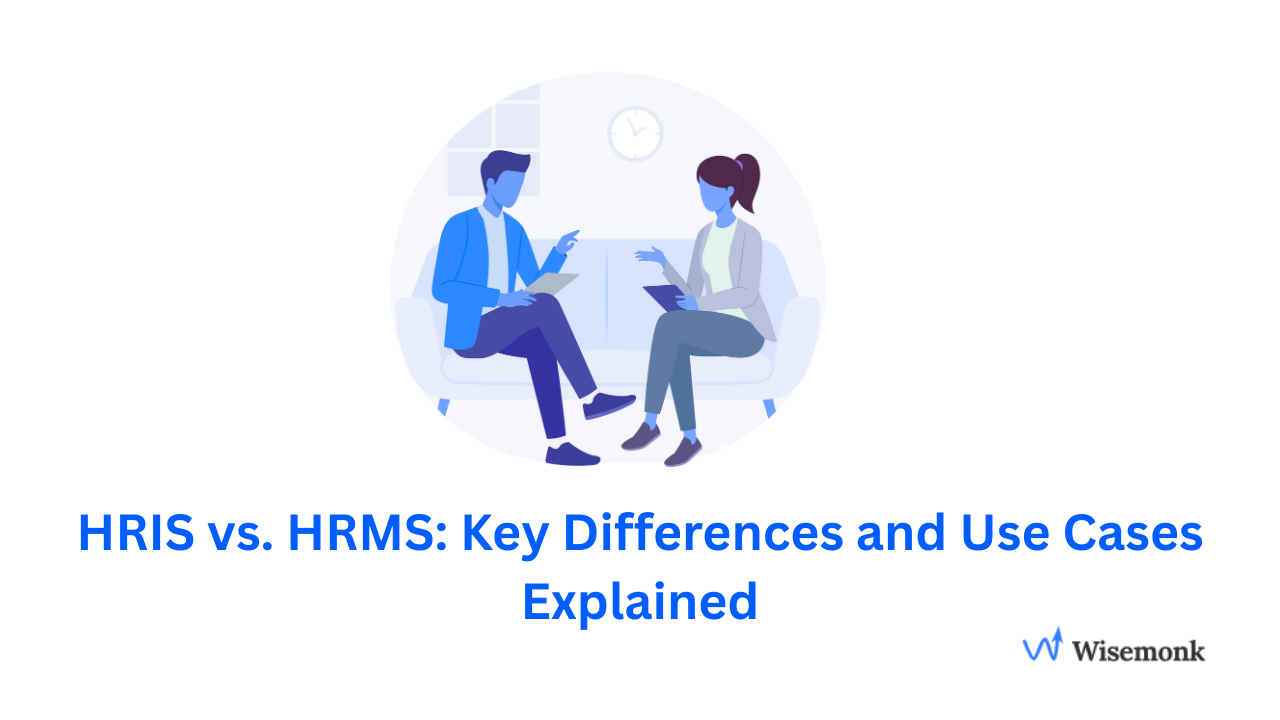
.png)
%201.png)